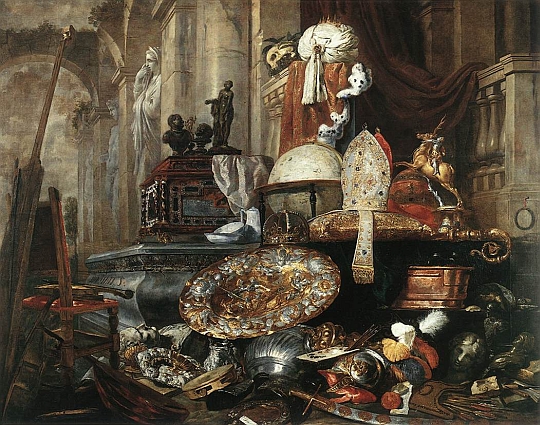
Behold a light far brighter than the Sun!
The Sun’s a shadow if you them compare,
Or grosse Cimmerian mist; the fairest Noon
Exceeds not the meridian night so far
As that light doth the Sun. So perfect clear
So perfect pure it is, that outward eye
Cannot behold this inward subtile starre,
But indisperst is this bright Majesty,
Yet every where out shining in infinitie;
Unplac’d, unparted, one close Unity,
Yet omnipresent; all things, yet but one;
Not streak’d with gaudy multiplicity,
Pure light without discolouration,
Stable without circumvolution,
Eternall rest, joy without passing sound:
What sound is made without collision?
Smell, taste and touch make God a grosse compound:
Yet truth of all that’s good is perfectly here found.
This is a riddle unto outward sense:
And heavy phansie, that can rise no higher
Then outward senses, knows no excellence
But what those Five do faithfully inspire
From their great God, this world; nor do desire
No more then then know: wherefore to consopite
Or quench this false light of bold phansies fire,
Surely must be an act contrary quite
Unto this bodies life, and its low groveling upright.
—Henry More, The Argument of Psychathansia; or, The Immortality of the Soul from Philosophical Poems (1647) in The Complete Poems of Dr. Henry More, p. 73 (A. Grosart ed. 1878)
Henry More is a bright but not particularly well known star in the constellation of the English metaphysical poets. A relative of Sir Thomas More, he spent his years as a philosopher at Cambridge, and his poetry is much like his philosophical writings. More is concerned with a reconciliation of philosophical and religious ideas, and in his writing we see the confluence of Platonic and Neoplatonic thought with the mainstream protestantism of his age (Anglican, with visible strands of Calvinism). But he takes a notably embracing and affirming attitude towards science–engagement with mathematics and the natural sciences is for him a devotional act, a reverential grappling with the mysteries of the universe. In fact, though More is probably best known for his concept of the “fourth dimension” (the spiritual world), he was also an accomplished mathematician. We see these ideas in this remarkable poem, and particularly in the numerology, since for More all numbers derive from and are given meaning by their relationship with the whole (“Unplac’d, unparted, one close Unity.”) For More the mathematical and spiritual worlds reflect one another, so in the moral world the concept of unity is mirrored in the notion of spiritual love, from which all moral and ethical laws flow as fragmentary elements. More forms a remarkable bridge between two fellow Cambridge men, John Milton and Isaac Newton. The traces of Milton’s thought and writings are apparent almost everywhere in More’s writing, whereas Newton is hardly to be imagined without the environment that More helped to craft at Cambridge–particularly the advocacy of natural science and fearless scientific inquiry.
Listen to the opening sonata and title aria from the Cantata “Ich habe Lust abzuscheiden” by Dietrich Buxtehude. This work was composed in Buxtehude’s days as the organist of the Marienkirche in Lübeck, probably around 1670, and it carries No. 47 in the historical-critical index of Buxtehude’s works (BuxWV). The text is taken from Philippians 1:23 (????????? ?? ?? ??? ???, ??? ????????? ???? ??? ?? ???????? ??? ??? ?????? ?????, ????? ??? ?????? ????????? – For I am hardpressed between the two; I long to depart and be with Christ, for that is far better.) The work unfolds very slowly and laden with pathos in a way that presages Bach’s passions. (After hearing some of Buxtehude’s organ music, the twenty-year-old Bach walked 250 miles to Lübeck to visit the aging master–this was in 1705, just two years before Buxtehude’s death). The aria speaks of weariness of the world and its illusory vanities, using a series of metaphors typical of the age and location. Human existence is likened to a shipwreck and reunion with heaven is called a safe harbor. A superior recording of this canata with Emma Kirkby singing the soprano part can be found on this Chaconne recording.



